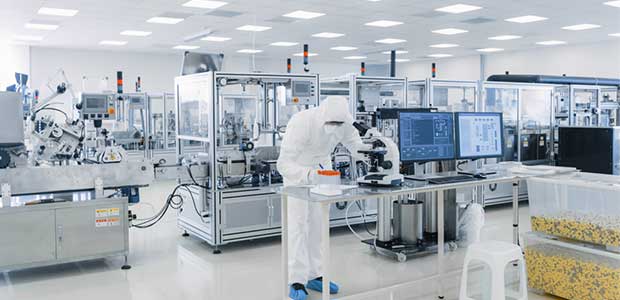
The Pharmaceutical Industry Needs the Right Anti-Fatigue PPE
If this past year has proven anything, it has proved that anti-fatigue precautions are needed for an already overworked industry.
- By Dr. Kevan Orvitz
- Oct 01, 2020
When we consider the “new normal” for the pharmaceutical industry, we must remember to focus not just on the well-being of employee-customer dynamics, but on the day-to-day health and safety precautions for pharmaceutical manufacturing employees. If this past year has proven anything, it has proved that anti-fatigue precautions are needed for an already overworked industry.
The impact of COVID-19 on the pharmaceutical industry has been significant. In the race to find treatments and a vaccine to address the global pandemic, pharmaceutical companies are working day and night, which makes them vulnerable especially when employees are working in close spaces like cleanrooms. Therefore, the chances of contagion transference and the potential spread of COVID-19 could pose a potentially greater risk.
There is no denying that COVID-19’s effect on the pharmaceutical industry has been astronomical. Many are facing several challenges to maintain a safer workplace for their workers and maintain an optimum cleanroom environment to reduce contamination.
Comfort and Control
The strategy of comfort and control encapsulates exploring solutions that not only provide comfort to workers but control the risk of contamination in the manufacturing process.
The potential health impacts of working in cleanrooms could be detrimental. In the absence of proper foot support, activities that involve repetitive tasks, forceful exertions, awkward postures or contract stress, can increase the risk of developing Musculoskeletal Disorders (MSDs). Standing on cold hard floors can also cause additional discomfort and, unfortunately, this impacts the overall productivity and alertness of workers, increasing the risk of contamination.
Therefore, as employers, we need to do a better job as an industry to ensure that foot protection is accounted for with employees’ PPE. And as employees, we also need to be advocating for ourselves to proactively get the right foot support, especially when foot discomforts or pain persist for extended periods on the job.
Without ergonomically efficient foot support, foot pain and fatigue can have lasting effects on the body and create harmful musculoskeletal disorders (MSDs). As the feet hold humans’ entire bodyweight, damage done to the foot on the job can leave permanent lifelong impacts. And as much as older employees could pose a higher risk for developing MSDs, healthy footwear habits should always be encouraged for young employees; many of these foot-related health issues could follow them for life if the right precautions aren’t taken now.
Exploring the right anti-fatigue solutions will not only help the employees with overall wellness and increase productivity but help reduce contamination concerns.
Pharmaceutical manufacturing demands processes and solutions that don’t increase contamination and helps in increasing purity. Therefore, choosing the right Anti-Fatigue solution is the key. The stationary anti-fatigue solution can have several disadvantages in this scenario and will increase the risk of –
- Contamination due to spills
- Obstruction in cart movement due to curling and damage
- Spreading the virus due to close setup
A mobile solution like Anti-Fatigue Insoles presents as the most efficient option. Providing personal safety and comfort to each employee. This can help reduce the risk contamination and maintain the integrity of the cleanroom from material spills while providing a 360-degree protection across the facility. Also, providing protection from cold floor temperature so that the employees can work comfortably.
A solution which provides both comfort and control.
The COVID-19 pandemic poses a considerable challenge to all industries including the pharmaceutical sector to maintain a safer workplace environment. Identification and choosing a more evidence informed solution will be the key.
This article originally appeared in the October 2020 issue of Occupational Health & Safety.
About the Author
Dr. Kevan Orvitz is the CEO of MEGA InTech, a leading provider of wearable technology for the workplace, providing accurate risk assessment and rehabilitation data and analytical key metrics allowing companies to proactively maximize employee engagement, productivity, and reduce risk.